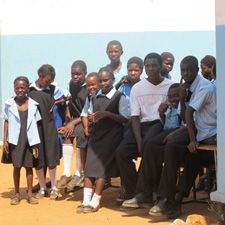There are a lot of reasons why a child wouldn't go to school—no books, bad teachers, sick parents or guardians or the need to work to support their families—but F.K. Day says the one we can affect is transportation.
To measure the impact of bicycles on keeping students in school, his organization, World Bicycle Relief, has partnered with World Vision to create the Bicycle Education Empowerment Program (BEEP). Through funding from World Vision, WBR will distribute 49,000 bicycles to 16 districts in 9 provinces in Zambia over the next three years.
To see a bicycle distribution, we're visiting Bimbe Basic School, a government school for grades 1-9 in Chongwe district. The school has just 9 teachers for 800 students. Classes are taught in morning and afternoon sessions and children go to school for a half day only.
Even with a five-hour school day, it's often difficult for young kids to make it to school. Most students get up at dawn to do their chores then walk long distances to get to school. By the time they get home they have little time to do homework or contribute to their families. A bicycle shortens their travel time to school, giving them more time to complete duties to support their families in the evening. More importantly, it gives them freedom, a sense of empowerment and elevates them in the eyes of their families and communities.
 The group walks 1 km to get an idea of what it feels like to travel long distances of by foot. Most Africans walk virtually everywhere they need to go, often walking some distance to get water from clean wells. Leah Missbach Day carries water in a bucket on top of her head the way the local women here might.
The group walks 1 km to get an idea of what it feels like to travel long distances of by foot. Most Africans walk virtually everywhere they need to go, often walking some distance to get water from clean wells. Leah Missbach Day carries water in a bucket on top of her head the way the local women here might.
 For many children in Zambia, going to school can be an exhausting and often dangerous experience. Traveling long distances on foot puts children, particularly girls, at risk for harassment and sexual abuse, poor nutrition and inability to provide critical support for their families.
For many children in Zambia, going to school can be an exhausting and often dangerous experience. Traveling long distances on foot puts children, particularly girls, at risk for harassment and sexual abuse, poor nutrition and inability to provide critical support for their families.

A bicycle distribution of 90 bicycles, the second batch of 140 total bicycles, to students at Bimbe Basic School. Parents, teachers and community leaders gather to witness the distribution because the bicycles are an enormous benefit not only to the students but to their families and communities. The program is formal and ceremonial with songs and speeches by school and community leaders and guests. The word "njinga," or bicycle, is repeated frequently in songs.
 Seventy percent of the bikes in the BEEP program go to girl students because they are less likely than boys to finish their education. In fact, 17 percent of Zambian girls complete grade 12 compared to 22 percent of boys. F.K. says if you can keep a girl in school the list of benefits runs the length of his arm. As a result of education, girls get married later, have fewer children and are more protective of their health.
Seventy percent of the bikes in the BEEP program go to girl students because they are less likely than boys to finish their education. In fact, 17 percent of Zambian girls complete grade 12 compared to 22 percent of boys. F.K. says if you can keep a girl in school the list of benefits runs the length of his arm. As a result of education, girls get married later, have fewer children and are more protective of their health.
A group of schoolgirls sing a song with the refrain: "A girl child can do what a boy child can do, as long as she's given a chance." Boys are often given preference to complete their schooling, but girls beg their parents to give them the same opportunity to learn and to improve their futures. These girls struggle against many odds but still fight for their right to an education.
 The recipient and a parent or guardian sign a contract that the bicycle's primary use is for the child to get to and from school and that it will be properly maintained. The entire community is present at the distribution to bear witness to the contract and ensure that the bicycles are not ill-used. Not only can kids get to school, but their parents and community elders are now invested in getting them there. They're taking their commitment to heart.
The recipient and a parent or guardian sign a contract that the bicycle's primary use is for the child to get to and from school and that it will be properly maintained. The entire community is present at the distribution to bear witness to the contract and ensure that the bicycles are not ill-used. Not only can kids get to school, but their parents and community elders are now invested in getting them there. They're taking their commitment to heart.


